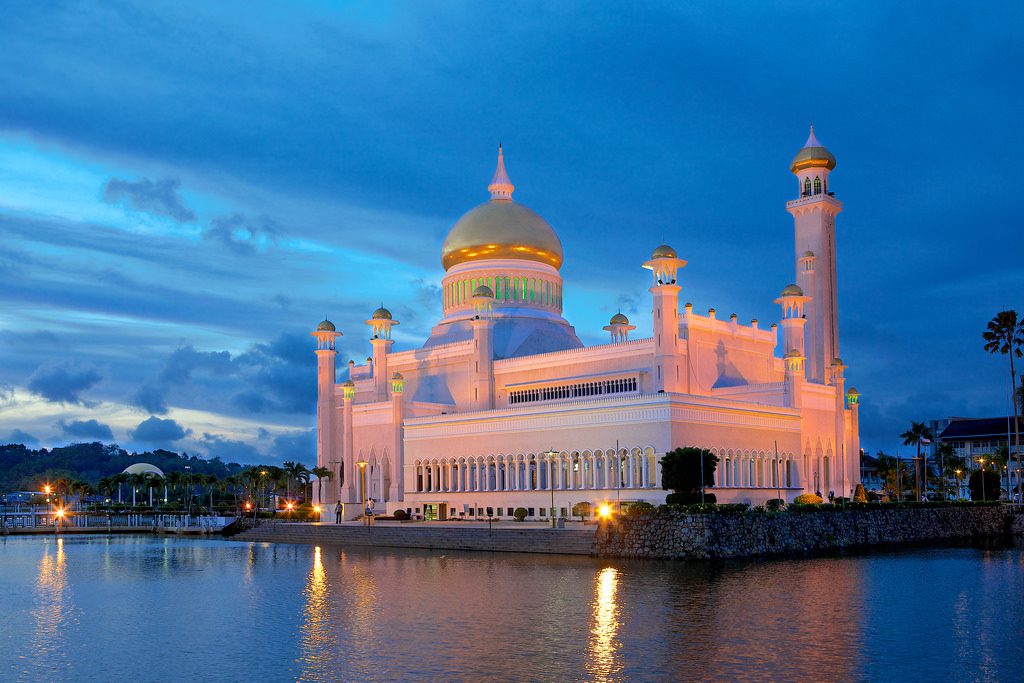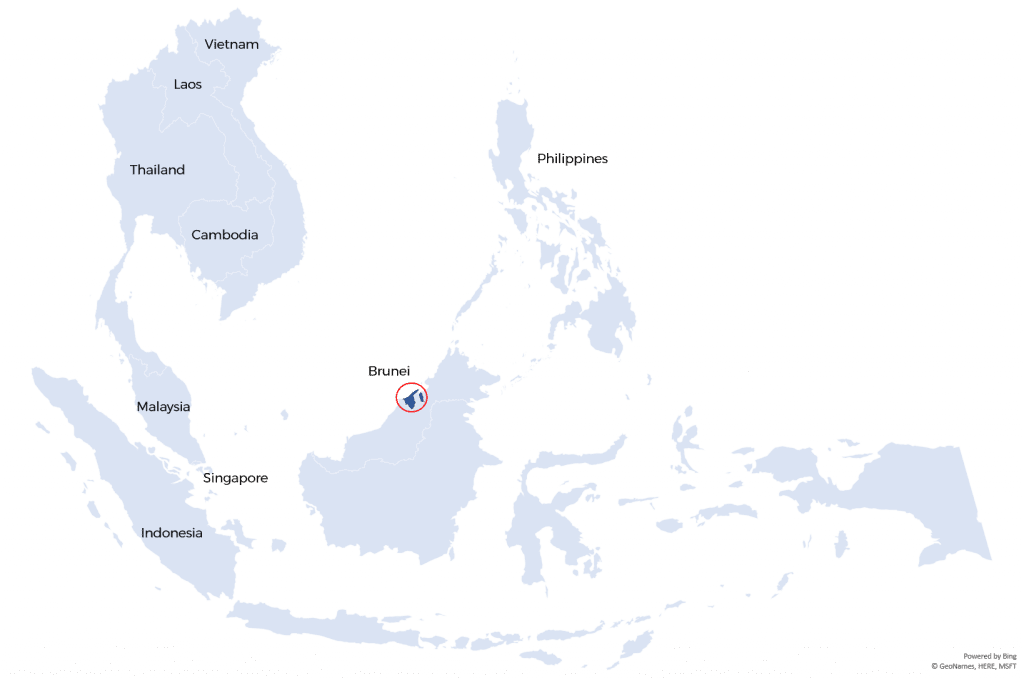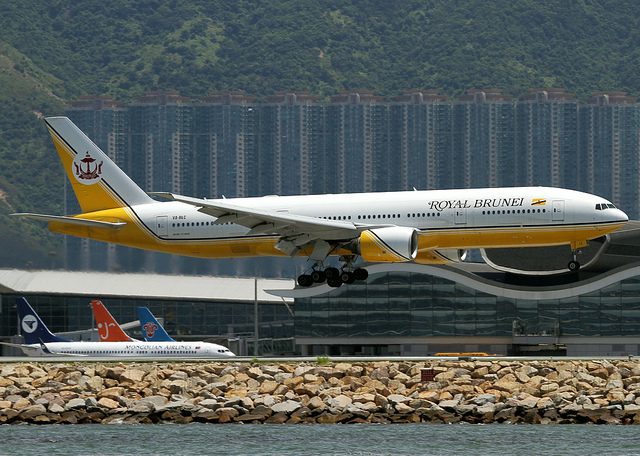Royal Brunei Airlines Takes On Tourism Promotion for a Whole Country

Photo Credit: Sultan Omar Ali Saifuddin Mosque in Brunei. VisualHunt / ¡kuba!
Skift Take
The national carrier has set a target of doubling visitor arrivals to Brunei by 2021. But news of the country getting closer to the full implementation of Sharia law could be unsettling for many potential tourists.
For a rich sultanate, Brunei is mightily poor in attracting tourists. Poorer countries in Southeast Asia such as Cambodia, Laos, and Myanmar, all of which came to the tourism table later than Brunei, have fared better. Cambodia now gets six million arrivals a year, Laos more than four million, and Myanmar 3.5 million last year, even with a tourist backlash over its Rohingya refugee crisis.
Brunei? Just 278,100 arrivals in 2018.
“Singapore gets that in a week,” said Karam Chand, CEO of Royal Brunei Airlines.
The carrier is taking matters into its own hands — or perhaps has been asked to. While it’s normal, in fact imperative, for national airlines to support country promotions, Royal Brunei is playing “the leading role in destination marketing,” Chand told Skift in an interview at the recent Aviation Festival Asia in Singapore.
The airline has in the past launched destination campaigns to promote Brunei. The difference is it has now become the lead tourism marketing agency that charts promotional strategies and the implementation of various campaigns in key international markets, a job that is typically handled by a country’s national tourist board, albeit ineptly sometimes.
Chand said Brunei Tourism’s role is “more about doing efforts on the ground, setting standards, regulating the industry — for example ensuring tours are safe — and helping create new products by working with tour operators and hoteliers.”
“We basically told Brunei Tourism to leave the international destination marketing to us. We’re a bit more experienced in international marketing, as we’ve been doing it for 44 years and we have the people, skills set, and funds. Our knowledge and presence in the [overseas] markets also gives us a significant upside compared to Brunei Tourism,” Chand said.
Royal Brunei’s board has approved a special funding for marketing the destination, he said. The airline is state owned and does not reveal figures as part of government policy.
“Brunei Tourism does not have much funds per se,” Chand added. “That’s one of their challenges; they can’t go to international markets and push hard. Someone has to do this. At the end of the day, with a 25 percent growth in our capacity, it is a commercial imperative to make sure it happens. After all, we are the first beneficiary of an increase in arrivals to the country.”
The airline accounts for 80 percent of the seats flown to and from Brunei.
Airline funding has gone toward a branding and digital campaign done by M&C Saatchi Singapore and Happy Marketer, and in collaboration with Brunei Tourism, which is a department under the Ministry of Primary Resources and Tourism.
But these efforts face an uphill battle.
Sharia Law
For all its riches, bankrolled by its vast reserves of petroleum and gas, Brunei has been stingy in handing out destination marketing dollars compared to neighbors such as Singapore, Thailand, Malaysia, and Indonesia.
This may be deliberate, out of a desire to preserve its Islamic ways and heritage. Moreover, Sultan Hassanal Bolkiah’s intention to roll out capital punishment under Sharia law, including whipping and stoning to death for same-sex activity, could be an insurmountable roadblock to attracting international tourists.
In fact, this article was written just before Skift learned that Brunei has taken another step closer to the full implementation of Sharia. Sharia punishments also include the amputation of limbs for those found guilty of theft and a death sentence for anyone guilty of apostasy.
Bolkiah launched the first phase of Sharia in 2014. And a plunge in global oil prices in 2015 saw a massive decline in government revenues in 2016. With it, a plan called Wawasan Brunei (Vision Brunei) 2035 was launched to diversify Brunei’s economy and develop sectors such as health, education, infrastructure, recreation, and tourism.
Chand became CEO when all this was happening. Formerly Royal Brunei’s chief commercial and planning officer, he replaced deputy chairman Dermot Mannion, whose term was up.
Fully owned by the government, Royal Brunei naturally realigned its business plans to support the economic diversification strategy. Hence, the burst of energy that has invigorated the airline in recent months.
It aims to increase arrivals to Brunei to 500,000 by 2021. As connectivity is key — what’s the point of marketing if there are no flights — the airline is furiously expanding its network, launching new services and reinstating those that have been suspended.
Two weeks ago, it launched thrice-weekly direct services to Narita, Tokyo, the first in over two decades.
In October last year, it launched new daily nonstop flights to London Heathrow. The new direct London flights also shave off five-plus hours for passengers traveling from Melbourne to London via Brunei as previously it involved another stop in Dubai for refueling.
From June 12, the airline will also offer one-stop Brisbane-Brunei-London flights. Four weekly flights to Brisbane will operate from June 11, after a suspension in 2011.
It recommenced four weekly services to Kuching, Sarawak, in Malaysia last December, after a suspension in 2011.
Aside from traditional markets such as Japan, the UK, Australia, and Malaysia, it is going after today’s huge markets such as China and India.
Last November, it launched twice-weekly direct services to Haikou and will launch flights to Changsha on April 16. This brings to seven the points Royal Brunei operates to China, which also include Nanning and Hangzhou.
There has also been a slew of new codeshares, including a daily service to Mumbai with Air India, launched last November, marking Air India’s first entry into Brunei, and thrice-weekly flights to Taipei launched last December in conjunction with China Airlines.
“Our focus now is opening more new markets. What that does is it changes the traffic mix, so we can get more point-to-point traffic to Brunei, and people can enjoy it as a tourism destination. Brunei is an emerging destination, but the good news is, we are creating better awareness through our digital marketing campaign,” said Chand.
He is also working hard on launching flights to Beijing. “This could be in July or October this year, depending on slots at the new Beijing airport. We’re making good progress.”
“The other market where I feel we have a big gap is India. There’s a large middle class, high disposable income, lots of passengers traveling, so we’re looking to see how we can address India,” Chand said.
Viable Path to Growth?
To date, Royal Brunei’s network has grown to 24, from 17 a year ago. That’s also because it took delivery of four new aircraft between May and November last year, completing a program updating its fleet with five Boeing 787-8 Dreamliners, seven A320NEO, and two A320 CEO aircraft.
“We have a fleet with an average age of two years. I don’t know any airline in the world that has that, unless you’re a startup with new planes. Usually, the age is six to seven years,” said Chand.
The only way for Royal Brunei to compete is to offer the latest product and the best service, he said.
In November, it recruited more than 60 Bruneians to fill cabin crew roles, the largest recruitment since the airline started operation in 1974.
“We want to make sure our people are internationally competitive. One of the things we do is to put young people through an entrepreneurship program, where they are mentored by leaders like us,” said Chand.
He admits it’s a challenge to get people to be service focused. “It’s easier to say our goal is a 10 percent earnings margin, people could relate to that, but to sell a dream like ‘everything you do is going to be guest focused’ is tough. We work hard to do that.”
What appears tough for many passengers, however, aside from Sharia law, is the three-letter word — dry. Royal Brunei operates alcohol-free flights and though it boasts a Dreamliner service from Brunei to London, flyers — at least those from Australia, based on social media feeds — feel that for such a long flight, and in business class, they would expect wine.
Being a dry country also exacerbates Brunei’s image as boring, with no fun, no nightlife, and not much to see.
Chand said part of the brief to M&C Saatchi was to change those negative perceptions. “We’re persuading potential guests, ‘you’ve seen big cities, you live in one, why not consider a completely alternative product where you’ll feel the peace, tranquility, warmth of the people?’
“The perception about dry is also not correct. Visitors can bring in alcohol and consume it privately. We’ve had great success with the Korean traffic. Koreans know you can’t buy alcohol in Brunei, but they can declare their duty-free allowance like anywhere else in the world and consume it smartly in consideration of the local culture and ethos. It hasn’t stopped the Koreans, to such an extent we’ve gone from two to four flights weekly in a short period of time.”
As tourists and tour operators seek less-crowded destinations, as spelled out by a Skift Megatrend, Undertourism is the New Overtourism, Brunei may have its day. Destination branding has already improved. Brunei Tourism’s website dangles an “abode of peace,” where you’ll never have neighbors noisier than proboscis monkeys, and where museums are more immersive (showing a shipwreck dive site).
Brunei boasts one of the world’s best dive sites, rainforests and national parks, gilded mosques, and warm people, seemingly an ideal combination for new-age travelers that want to connect with a country and its community.
With the right branding, more marketing, and better access, it might shed its uninviting image. After all, Singapore too was once labeled boring. The Lion City now gets 18.5 million arrivals.
Half a million tourists for Brunei would be a huge achievement. Whether it can get to those numbers even as it moves forward to enact complete Sharia law remains to be seen.
(This article was updated to include news that Brunei will enact its Sharia Penal Code on April 3.)




